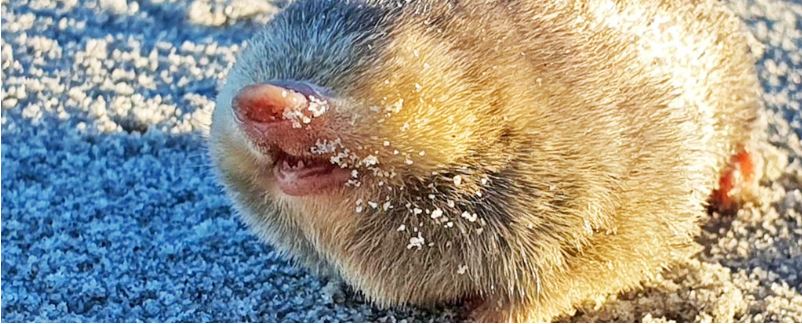


 5:32:36
5:32:36  2024-01-05
2024-01-05  1473
1473

De Winton's golden mole (Crypochloris wintoni) was feared extinct for almost a century.
But with the help of a canine friend scientists have rediscovered them on the west coast of South Africa for the first time since 1936.
"The amazing part for me is that it's been there all this time, and nobody knew," says Jean Pierre Le Roux from South Africa's Department of Environmental Affairs.
"Now we finally know."
These blind tubes of fuzz are so elusive because they not only spend most of their lives underground, but the way they swim through the sand also leaves little trace behind.
Their fur shines with special oils that lubricate their path as the small mammals worm their way under the four inches of sand keeping them cool during the hot desert days.
Their shallow tunnels instantly collapse back in behind them, leaving only an exposed trail on the surface, which is easily swept away by the elements.
De Winton's golden moles never emerge to drink water either. They only surface to find food during the night.
"The search for De Winton's golden mole was not easy by any means," notes conservation biologist Christina Biggs of Re:wild, an organization which provided some of the funding for the discovery.
"They left no sandhill unturned and now it's possible to protect the areas where these threatened and rare moles live."
To find this spade-handed Houdini in its sea of shifting sand, Stellenbosch University conservation geneticist Samantha Mynhardt and colleagues turned to environmental DNA.
"Extracting DNA from soil is not without its challenges," explains Mynhardt.
"But we have been honing our skills and refining our techniques – even before this project – and we were fairly confident that if De Winton's golden mole was in the environment, we would be able to detect it by finding and sequencing its DNA."
To narrow the field the researchers recruited a sniffer dog called Jessie.
Lacking a sample scent to direct Jessie, the team turned to a process of elimination, training the dog to sniff out three other known species of mole in the area.
Some of the mole tracks and burrows they encountered Jessie couldn't identify, suggesting they belonged to a species she'd never smelt before.
Together the team collected over 100 soil samples along with all sorts of DNA containing fur, skin and feces from whatever animals had wandered by.
To the researchers' joy the eDNA within these samples suggest there's a population of De Winton's golden mole from Lambert's Bay northwards to Port Nolloth.
They also found traces from another endangered species, Van Zyl's golden mole (Cryptochloris zyli).
Golden moles aren't actually true moles, but more closely related to aardvarks and sea cows.
They have unique ear bones to help boost their ability to hear through sand and compensate for their lack of sight.
They eat worms, insects and sometimes small reptiles and help maintain healthy soils by turning it over and fertilizing it.
Mining, agricultural and residential development activities pose a threat to however many of these rare animals remain.
"Not only have we solved the riddle, but we have tapped into this eDNA frontier where there is a huge amount of opportunity – not only for moles but for other lost or imperiled species," concludes conservation manager Cobus Theron.
Reality Of Islam |
|

Labor short

A new ultra

Batteries p
 9:3:43
9:3:43
 2018-11-05
2018-11-05
10 benefits of Marriage in Islam
 7:5:22
7:5:22
 2019-04-08
2019-04-08
benefits of reciting surat yunus, hud &
 9:45:7
9:45:7
 2018-12-24
2018-12-24
advantages & disadvantages of divorce
 11:35:12
11:35:12
 2018-06-10
2018-06-10
 6:0:51
6:0:51
 2018-10-16
2018-10-16
 6:28:21
6:28:21
 2022-12-20
2022-12-20
 3:42:22
3:42:22
 2021-12-24
2021-12-24
 4:25:57
4:25:57
 2023-02-11
2023-02-11
 11:11:59
11:11:59
 2023-02-01
2023-02-01
 2:13:43
2:13:43
 2022-05-27
2022-05-27
 7:0:55
7:0:55
 2022-05-17
2022-05-17
 3:43:50
3:43:50
 2022-11-05
2022-11-05
 5:41:46
5:41:46
 2023-03-18
2023-03-18
| LATEST |